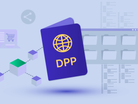How the EU's Digital Product Passports Impacts Manufacturers

The Digital Product Passport (DPP) initiative is part of the EU’s broader Ecodesign for Sustainable Products Regulation.
Its primary goal is to bridge the information gap in product value chains by offering detailed, accessible records about a product’s origin, composition, environmental impact and disposal methods.
By requiring comprehensive product details, the DPP aligns with growing consumer demand for transparency and pushes for accountability across industries.
Each DPP will carry essential information, including a unique identifier, documentation of compliance and specifics on hazardous substances.
The database will also include user manuals, safety guidelines and recycling instructions. Accessible via QR codes or near-field communication (NFC) tags, DPPs allow stakeholders to track a product’s lifecycle from production to disposal.
This approach supports better supply chain management, regulatory adherence and risk mitigation for businesses.
Manufacturers adapt to meet new standards
DPPs are not confined to one sector. The EU has prioritised industries such as textiles, electronics, construction, chemicals and plastics for DPP adoption by 2030.
This aligns with initiatives like the European Green Deal and the Circular Economy Action Plan, which aim to foster sustainable practices across multiple markets.
The EU’s Corporate Sustainability Due Diligence Directive, expected to take effect this year, highlights this commitment by holding corporations accountable for human rights and environmental violations within their supply chains. Companies found non-compliant may face fines of up to 5% of their revenue.
Fashion is a key industry under scrutiny and retailers including H&M, Nike and Puma already publish detailed supplier lists to demonstrate accountability.
However, major players like Inditex, the parent company of Zara, have been slower to adopt these efforts.
In March 2024, Dutch asset manager MN - a shareholder in Inditex - remarked: “Even though Inditex assures us that they have this data available, up until now Inditex is not willing to disclose this information unlike some industry peers who publish extensive supplier lists.”
Collaboration and success stories
Some brands are already integrating DPPs to enhance traceability, for example Tommy Hilfiger launched a partnership with The ID Factory in 2020.
According to Nicolò Giusti, Director of Sourcing and Production Footwear at Tommy Hilfiger: “Traceability and transparency are fundamental to guarantee sustainability.”
The company has achieved 95% visibility of its materials, significantly improving supply chain efficiency and reducing operational costs.
A DPP pilot project involving suppliers in Portugal and China showcases how this technology benefits businesses and consumers.
By scanning a QR code on a Tommy Hilfiger product, customers can trace the journey of materials, assembly locations and supplier details. This creates a deeper connection between buyers and the product’s lifecycle while promoting sustainable choices.
The collaboration also enhances supplier relationships, shifting from a simple supply chain to what Giusti calls a “value chain.”
By involving suppliers in addressing the environmental and social impacts of their materials and processes, brands foster trust and align with sustainability goals.
Looking ahead
The rollout of DPPs marks the beginning of a new era for businesses, regulators and consumers. The EU’s initiative demonstrates how transparency and sustainability can transform industries.
“Around 90% of fashion’s environmental impact occurs in the supply chain - and while customers cannot see these impacts directly, this is where the real change can happen and where the majority of targets and actions must be directed," comments Marie-Claire Daveu, Chief Sustainability at Kering.
By embracing DPPs, industries not only meet regulatory demands but also gain a competitive edge in a marketplace increasingly driven by ethical and sustainable practices.
Make sure you check out the latest edition of Manufacturing Digital and also sign up to our global conference series - Manufacturing LIVE
Manufacturing Digital is a BizClik brand.


